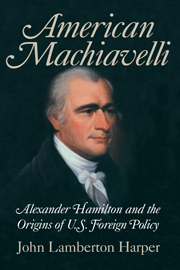Book contents
- Frontmatter
- Contents
- List of Illustrations
- Acknowledgments
- Miscellaneous Frontmatter
- Introduction
- PART I THE COMING OF NECESSITY
- PART II BATTLE LINES ARE DRAWN
- PART III SEIZING THE HELM
- PART IV INFORMAL ADVISER TO THE PRINCE
- 12 Return to Not-So-Private Life, 1794–1795
- 13 “Camillus” into the Breach
- 14 A High-Stakes Game: Washington’s Farewell Address, 1796
- 15 Transition to the New Regime, 1796–1797
- PART V A PRINCE IN HIS OWN RIGHT?
- PART VI THE LESSER OF EVILS
- Conclusion: Hamilton Then and Now
- Notes
- Bibliography
- Index
13 - “Camillus” into the Breach
Published online by Cambridge University Press: 05 April 2013
- Frontmatter
- Contents
- List of Illustrations
- Acknowledgments
- Miscellaneous Frontmatter
- Introduction
- PART I THE COMING OF NECESSITY
- PART II BATTLE LINES ARE DRAWN
- PART III SEIZING THE HELM
- PART IV INFORMAL ADVISER TO THE PRINCE
- 12 Return to Not-So-Private Life, 1794–1795
- 13 “Camillus” into the Breach
- 14 A High-Stakes Game: Washington’s Farewell Address, 1796
- 15 Transition to the New Regime, 1796–1797
- PART V A PRINCE IN HIS OWN RIGHT?
- PART VI THE LESSER OF EVILS
- Conclusion: Hamilton Then and Now
- Notes
- Bibliography
- Index
Summary
Introduction
Machiavelli dedicated much of his Discourses to distilling the lessons of Roman and recent Italian history for vulnerable and emerging states. “One of the most prudent practices of men,” he observed, “is to abstain from threatening and insulting someone with words; neither weakens the enemy, while the one makes him more cautious, and the other makes him hate you more and study with greater industry how to hurt you.” Another lesson was that: “Princes under assault by much more powerful forces can make no greater error than to refuse (recusare) any agreement, especially when it is offered to them: for there will never be an offer so empty that it doesn’t contain some benefits for the one who accepts it.” As was often the case, Machiavelli used the example of Florence in 1512. The invading Spanish, desperate for food and supplies, at one point had dropped their demand that the Medici family be restored to power and had accepted instead their return to Florence as private citizens, plus a payment of cash and provisions, in exchange for evacuating Florentine territory. The Florentines refused the deal, enraged the Spanish, and lost their republic as a result.
To illustrate his maxims, Machiavelli often invoked the figure of Furius Camillus, a Roman leader repeatedly called upon to save his city from calamity. Someone who did not shrink from unpopularity, Camillus had once been falsely accused of misappropriation of funds and went into temporary exile. His enemies included one Marcus Manlius, who (according to Plutarch) “took that ordinary course toward usurpation of absolute power, namely, to gain the multitude, those of them especially that were in debt.” Camillus’s most famous exploit had been to rescue Rome from its partial occupation by the Gauls. Through Camillus, Machiavelli taught that enemies should either be rendered harmless or befriended. Camillus was deeply admired, and able to overcome his rivals’ envy, thanks to his virtù as a leader. But he was also hated because he gave the spoils of conquest to the public treasury rather than dividing them among the people and seemed arrogant and full of himself. For a political leader to evoke hatred, but for reasons which gained him nothing, was to play with fire.
- Type
- Chapter
- Information
- American MachiavelliAlexander Hamilton and the Origins of U.S. Foreign Policy, pp. 163 - 170Publisher: Cambridge University PressPrint publication year: 2004



